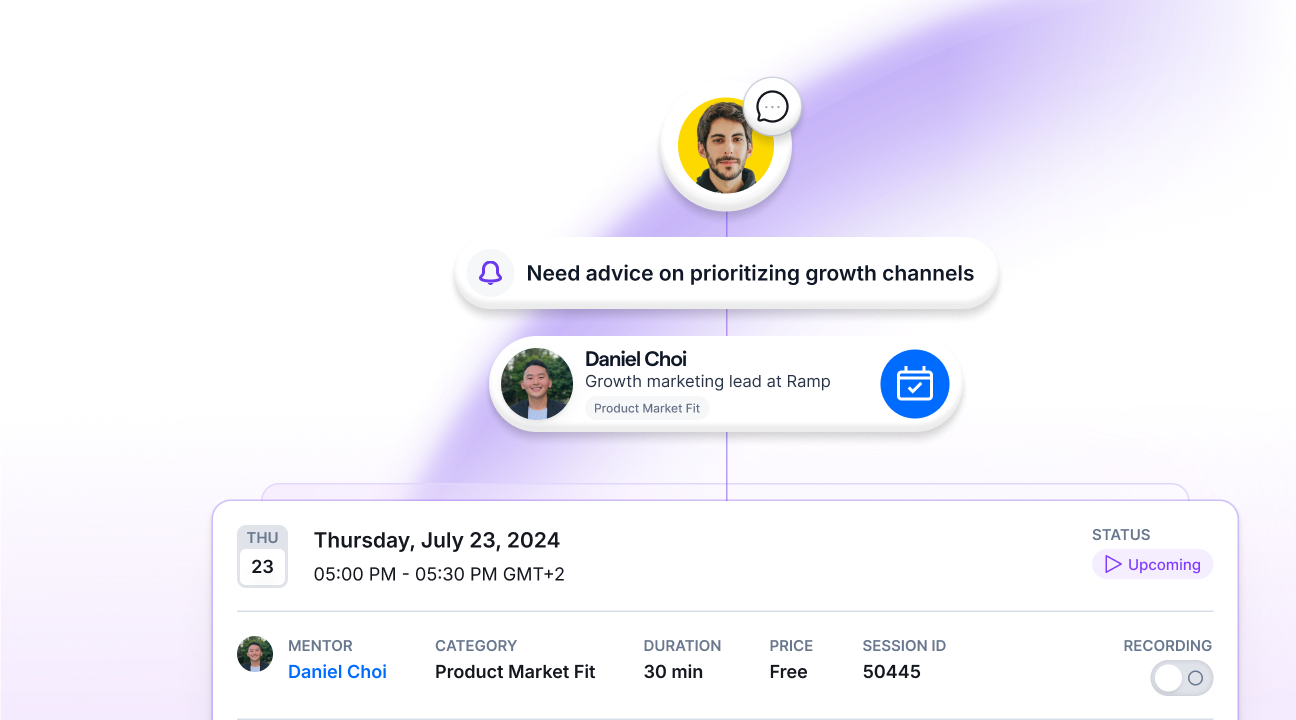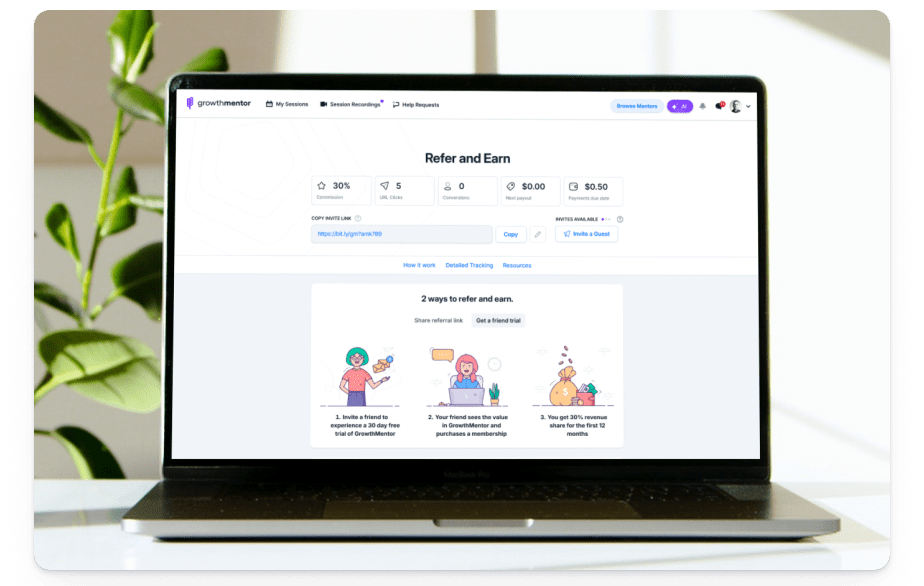“It’s insane how I’m able to hop on Zoom calls with hundreds of experts that work at some seriously impressive companies!”


Come for the mentorship
Connect with the right people and get unstuck


Find your mentor

Book a Call

Get unstuck
GTM mentors at your fingertips
What would you like to get better at today?
Just a few of the topics being discussed over casual conversations on GrowthMentor
Book Zoom calls with vetted growth mentors and get personalized advice that's relevant to your situation.
How do we define our ideal customer persona?
How do we craft a compelling value prop?
How do we know what GTM motion to use?
How should we price our product?
How do we identify our ICP’s pain points?
How do we conduct competitor research?
How do we use partnerships as a GTM motion?
How do we build a community-led GTM motion?
What metrics indicate GTM success?
How do we scale a successful GTM motion?
What distribution channels should we use?
How do we differentiate from competitors?
How can we expand to a new user base?
How do we adapt our GTM motion for new geos?
All your questions about mentorship, answered
Why should I talk to a go-to-market strategy mentor?
Go to Market strategy is a tricky beast. Because there’s no one right way to do it.
The entire answer to the question of: “what’s the best GTM strategy?” is: “it depends on your company and your product.”
Therefore, you can’t rely on advice and hacks flaunted online as “the best way to do GTM.”
You may come closer to a “real” result if you find case studies of companies highly similar to yours. However, it’s highly unlikely you’re going to find a case study that’s similar enough to your company to guarantee success.
While it may not seem like it, GTM takes transforming a huge amount of theoretical knowledge into practical tactics. This might look like:
- For a product in X price category, this marketing channel is enabled, this channel is disabled.
- Of all of our competitors on the market, we are higher priced/lower priced/right in the middle of the industry price range. This means we need to focus on Y as our USP.
- Based on our customer lifetime value (LTV) and acquisition cost (CAC), we need to increase/decrease our pricing.
Thus, to do it well, you need someone with a highly analytical mind, a wealth of theoretical knowledge, and months, if not years, of experience to gauge what will likely work.
Which means not just anyone on your marketing (or occasionally product) team can manage it.
But, you can get all of the above by speaking with a GTM strategy mentor.
What can a GTM strategy mentor do for me?
As mentioned above, GTM strategists bring a unique ability to translate purely theoretical knowledge into practical application.
A GTM strategy mentor will be able to sit down and analyze your company’s unique situation. They’ll ask plenty of questions to determine any nuances they should be aware of.
From there, they’ll be able to break down a GTM plan into manageable chunks, regardless of whether you need GTM strategy for a single feature launch or your entire product.
And you won’t walk away with a simplistic checklist that makes GTM feel like “checking off another box.”
Instead, because you’re taking the “done with you” approach, your mentor will help you understand why each task matters, why they suggest certain channels, why they recommend against others, and why they suggest taking the sales and customer success approaches they do.
Should I talk to a GTM strategy mentor now?
GTM strategy is one of the few business areas that could be applied at almost any time, depending on how broadly or narrowly you’re defining GTM.
Chatting with a GTM strategy mentor might be necessary when:
- You’re considering entering a new market.
- You know you have P-M fit, but it feels like your competitors are leaving you in the dust.
- You’re scaling at a fast pace and want to maintain lead and user quality across sales, marketing, and customer success.
- Your customer acquisition seems “leaky” across your marketing and sales functions.
- You’re rapidly expanding the features of your product and need to coordinate feature release campaigns.
A GTM strategy mentor will be able to analyze which case applies to your company and provide completely individualized strategic recommendations. Meaning: your GTM strategy will be based on real data and experience, not just random guesses.
Why should I trust GrowthMentor’s GTM mentors?
Excellent question. After all, the “mentorship” world is full of high-priced consultants, armchair analysts who have never done the work themselves, and outright snake-oil salesmen looking to make a quick buck.
But, there are plenty of experts out there who want to share their experience and knowledge. At GrowthMentor, we’re lucky to have 700+ of those experts.
The secret comes from our vetting process. We not only double-vet all of our mentors so only the top 3% makes it through our process, we also look at their soft skills. Because no one wants a mentor who’s a snob or a jerk.
On top of it, 85% of our mentors don’t charge an extra fee. Why?
The short answer: Because they want to help people.
The long answer is because…
- They enjoy sharing their knowledge
- They learn from their mentees
- They want to be a “force for good” in the business world
- They want to pay it forward
But don’t just trust our word on it. Hear from the mentors themselves.
Join the most uplifting community on the internet


















